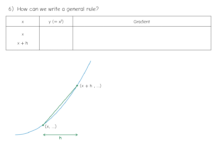This week’s topics included:
- World Philosophy Day
- First GCSE Foundation revision session
- Linear simultaneous equations by substitution
- Introducing volume and surface area of pyramids, cones and spheres
- Knowledge organisers in Maths
- Differentiation from first principles / general resources
- Conversion graphs
- Pearson’s Steps and Footsteps
World Philosophy Day
60 Second Adventures in Thought, particularly Hilbert’s Hotel (Open University)
Monty Hall problem (suggestion from @mathsteacher09)
Zeno’s paradox (suggestion from @CatherineFarmar and video from Numberphile)
Does 0.999… equal 1? (suggestion from @EmmaCookeBooks and video from Brilliant.org)
Other suggestons included: Do numbers exist? Was maths discovered or created? Goedel’s Incompleteness Theorem.
First GCSE Foundation revision session
Foundation tier revision resources (Resourceaholic)
AQA problem-solving resources or topic tests (suggestion from @DJUdall)
Run through “first 10 questions” to identify easier areas to fix (suggestion from @HawesMaths)
Dr Frost Maths shadow papers (subscribers only)
Linear simultaneous equations by substitution
The final step of substitution (Variation Theory)
Substitution worksheet (Go Teach Maths – subscription required)
Old textbook exercises (suggestion and links from @mathsjem)
Rayner textbooks (suggestion from @ThainMike)
Set of ten questions (from me via Twitter)
Introducing volume and surface area of pyramids, cones and spheres
Demonstrating the relationship between volumes of cylinders and spheres/cones (PBS Learning)
Using a giant tennis ball for surface area of a sphere (Resourceaholic)
Start with spheres and hemispheres, then do cones and pyramids, then frustums (suggestion from @mathsjem)
Orange peel activity for surface area of a sphere (BBC Bitesize)
Cylinder, cone and sphere volume (Megan Millan on YouTube)
Spheres and cones booklet (MathsGenie)
Knowledge organisers in Maths
Give students an organiser to fill in with illustrative examples as you go through the unit (suggestion from me)
Students create knowledge organisers using a template at the end of a topic – organisers can then be used in end of topic assessments (suggestion from @BrookeEHunter)
Only include vocabulary and facts, given at the start of the unit and used for homework/Do Nows (suggestion from @GemmaHeald)
There is a lot of interesting discussion on this thread around the value of knowledge organisers in Maths, particularly given the time investment – all well worth a read if you’re using or thinking of using them.
@DirectorMaths has also put a poll up here to collect further opinions and data.
Differentiation from first principles / general resources
Matching functions and derivatives (Standards Unit via Mr Barton Maths)
Identifying stationary points (Dr Austin Maths)
Geogebra – differentiation from first principles (Ben Sparks / Mark Willis)
Gradient match (Underground Maths)
Introduction to differentiation (resource from @tm_maths)
Susan Wall’s resources (STEM – requires login)
CIMT A Level chapter on introducting differentiation (CIMT)
Harder differentiation match-up (Dr Austin Maths)
Differentiation condebreakers (Andy Lutwyche via TES)
Conversion graphs
GCSE exam booklet (KESH takeaway 1MA0)
Currency exchange activity – scroll down to Activity 3.3 (CIMT)
Pearson’s Steps and Footsteps
We’re still looking for ideas on this one!
